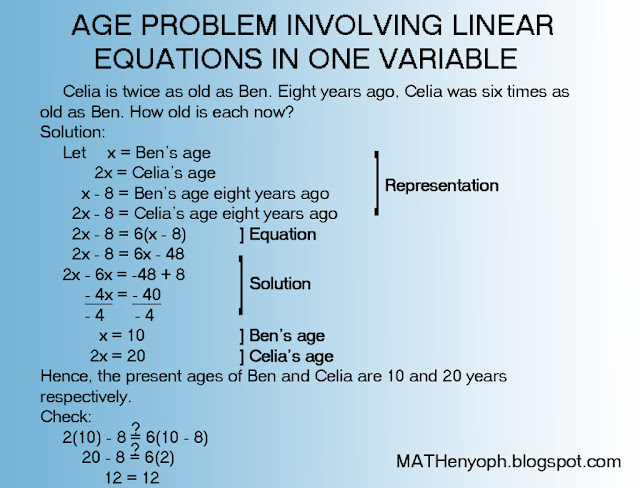Two jeepneys starting from the same place and traveling in opposite directions are 528 kilometers apart in 6 hours. One rate is 7 kilometers per hour faster than the other rate. Find the rate of each.
Solution:
Let x = rate of one jeepney
x + 7 = rate of the other jeepney
Based from the distance formula, D = rt, where D is the distance, r is the rate and t is the time, then
6x + 6(x + 7) = 528 ] equation
6x + 6x + 42 = 528
12x = 528 - 42
12x = 486
12 12
x = 40.5 kms per hour ] speed of one jeepney
x + 7 = 47.5 kms per hour ] speed of the other jeepney
Hence, one jeepney was traveling at 40.5 km/hr while the other jeepney was traveling at 47.5 km/hr.
Check:
6(40.5) + 6(40.5 + 7) = 528
243 + 6(47.5) = 528
243 + 285 = 528
528 = 528
Saturday, February 20, 2016
Friday, February 19, 2016
AGE PROBLEM INVOLVING LINEAR EQUATIONS IN ONE VARIABLE
Celia is twice as old as Ben. Eight years ago, Celia was six times as
old as Ben. How old is each now?
Solution:
Let x= Ben’s age
2x = Celia’s age
x - 8 = Ben’s age eight years ago
2x - 8 = Celia’s age eight years ago
2x - 8 = 6(x - 8) - equation
2x - 8 = 6x - 48
2x - 6x = -48 + 8
- 4x = - 40
- 4 - 4
x = 10 - Ben's age
2x = 20 - Celia's age
Hence, the present ages of Ben and Celia are 10 and 20 years respectively.
Check:
2(10) - 8 = 6(10 - 8)
20 - 8 = 6(2)
12 = 12
old as Ben. How old is each now?
Solution:
Let x= Ben’s age
2x = Celia’s age
x - 8 = Ben’s age eight years ago
2x - 8 = Celia’s age eight years ago
2x - 8 = 6(x - 8) - equation
2x - 8 = 6x - 48
2x - 6x = -48 + 8
- 4x = - 40
- 4 - 4
x = 10 - Ben's age
2x = 20 - Celia's age
Hence, the present ages of Ben and Celia are 10 and 20 years respectively.
Check:
2(10) - 8 = 6(10 - 8)
20 - 8 = 6(2)
12 = 12
Thursday, February 18, 2016
COIN PROBLEM INVOLVING LINEAR EQUATIONS IN ONE VARIABLE
Mary has P10.50 in twenty-five centavo coins and ten centavo coins. She has 7 more ten centavo coins than twenty-five centavo coins. How many coins of each kind does she have?
Solution:
Let x = number of twenty-five centavo coins
x + 4 = number of ten centavo coins
.25x + .10(7 + x) = 10.50 - equation
100 [.25x + .10(7 + x)] = 10.50(100)
25x + 10(7 + x) = 1050
25x + 10x = 1050 - 70
35x = 980
35 35
x = 28 - number of twenty-five centavo coins
x + 7 = 35 - number of ten centavo coins
Hence, there are 28 twenty-five centavo coins and 35 ten centavo coins amounting to P10.50.
Check:
.25(28) + .10(35) = 10.50
7 + 3.5 = 10.50
10.50 = 10.50
Solution:
Let x = number of twenty-five centavo coins
x + 4 = number of ten centavo coins
.25x + .10(7 + x) = 10.50 - equation
100 [.25x + .10(7 + x)] = 10.50(100)
25x + 10(7 + x) = 1050
25x + 10x = 1050 - 70
35x = 980
35 35
x = 28 - number of twenty-five centavo coins
x + 7 = 35 - number of ten centavo coins
Hence, there are 28 twenty-five centavo coins and 35 ten centavo coins amounting to P10.50.
Check:
.25(28) + .10(35) = 10.50
7 + 3.5 = 10.50
10.50 = 10.50
NUMBER PROBLEM INVOLVING LINEAR EQUATIONS IN ONE VARIABLE
One number is four greater than the other. The sum of the two numbers is 43. Find the numbers.
Solution:
Let x = smaller number
x + 4 = larger number
x + (x+4) = 43 - equation
2x + 3 = 43
2x = 43 - 3
2x = 40
2 2
x = 20 - smaller number
x + 4 = 24 - larger number
Hence the number, 43, is the sum of the smaller number, 20 and the larger number 24.
Check:
20 + (20 + 4) = 43
43 = 43
Solution:
Let x = smaller number
x + 4 = larger number
x + (x+4) = 43 - equation
2x + 3 = 43
2x = 43 - 3
2x = 40
2 2
x = 20 - smaller number
x + 4 = 24 - larger number
Hence the number, 43, is the sum of the smaller number, 20 and the larger number 24.
Check:
20 + (20 + 4) = 43
43 = 43
Wednesday, February 3, 2016
MEASURES OF CAPACITY
10 milliliters (mL) = 1 centiliter (cL)
10 centiliters (cL) = 1 deciliter (dL)
10 deciliters (dL) = 1 liter (L)
10 liters (L) = 1 decaliter (DL)
10 decaliters (DL) = 1 hectoliter (HL)
10 hectoliters (HL) = 1 kiloliter (KL)
3 liters (L) = 1 ganta
25 gantas = 1 cavan
75 liters (L) = 1 cavan
10 centiliters (cL) = 1 deciliter (dL)
10 deciliters (dL) = 1 liter (L)
10 liters (L) = 1 decaliter (DL)
10 decaliters (DL) = 1 hectoliter (HL)
10 hectoliters (HL) = 1 kiloliter (KL)
3 liters (L) = 1 ganta
25 gantas = 1 cavan
75 liters (L) = 1 cavan
MEASURES OF WEIGHT
MEASURES OF VOLUME
Subscribe to:
Posts (Atom)







